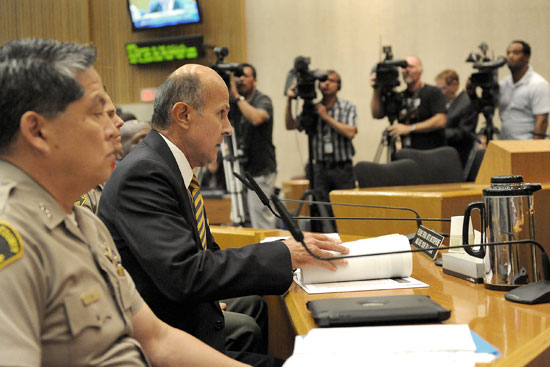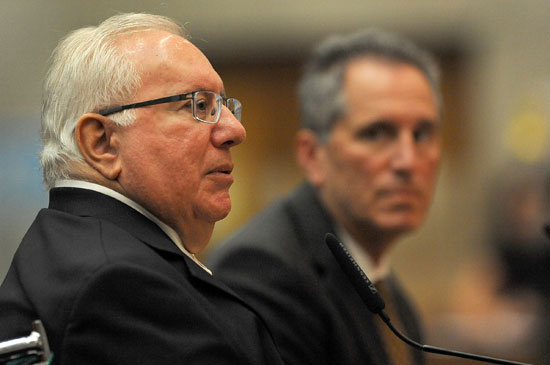
Sheriff Lee Baca assures the Board of Supervisors of his cooperation in reforming the jail system.
Confronted with a scathing report on brutality and mismanagement in the Los Angeles County jails, Sheriff Lee Baca has repeatedly insisted that he’s committed to implementing scores of recommended reforms. But given the beating the sheriff himself took in the report, the Board of Supervisors isn’t taking any chances.
The board unanimously voted this week to hire a monitor to track implementation of more than 60 recommendations made by the Citizens’ Commission on Jail Violence after a year-long investigation. While some of those recommendations address narrow but important policy issues, others urge a major overhaul of the department’s structure and accountability, including creation of an independent Office of Inspector General. The supervisors also voted to require the sheriff to provide progress reports during monthly appearances before the board.
The supervisors’ stepped-up scrutiny—which Baca on Tuesday told the board he supports—reflects their determination to build on the momentum of the jail commission’s widely-praised work and avoid criticism down the road that county leaders again neglected to act.
In its final report, the jail panel accused Baca and other top department officials of failing to rein in violent deputies, despite years of warnings and recommendations from various civilian watchdogs concerned about the treatment of inmates and the county’s potential liability. One of those monitors, Special Counsel Merrick J. Bobb, has written 31 semi-annual reports since serving on the landmark Kolts Commission, which, in 1992, advocated numerous reforms to curb widespread excessive force.
The jail panel noted that many of Bobb’s roughly 100 recommendations involving use of force and personnel issues in the jails went “unheeded” or “languished for more than a decade before the department responded.” The commissioners said concerns voiced by another monitor, the Office of Independent Review, also went unaddressed for years.
“At a fundamental level, the failure to heed recommendations made—and advanced repeatedly over time—is a failure of leadership in the department,” the seven-member commission wrote. “As the sheriff has acknowledged, it was his responsibility to ensure that reforms recommended by these oversight and advocacy groups were implemented and that problems of excessive force in the county jails were addressed. Yet, his response has been insufficient.”
Passages like those prompted the Board of Supervisors this week to intensify its involvement in the implementation of the latest recommendations. The “sheriff alone cannot restore long term-integrity to the department and fidelity to its core values,” Supervisor Mark Ridley-Thomas said in his motion to hire an “implementation monitor.”
But, as Special Counsel Bobb knows better than most, there’s actually little anyone can do to impose changes on the Sheriff’s Department unless the sheriff himself agrees to them. Unlike the Los Angeles Police Department’s chief, who is appointed by the mayor and reports to a civilian commission, the sheriff is publicly elected. As a result, he has wide legal authority over his department.
“There is no entity, person or institution who can direct the sheriff to do something,” Bobb says. “It is up to the unfettered discretion of the sheriff.”
That’s not to say that the five members of the Board of Supervisors are without leverage; they hold the department’s purse strings, a powerful incentive for the sheriff to be accommodating. The board members also can use their high-profile positions to exert public pressure on the sheriff.
Bobb says it’s been “terribly frustrating” over the years to see his recommendations for departmental change get so little action beyond what the jail commission described in its report as “lip service.” But Bobb says he’s heartened by the department’s movement toward adopting several of his recommendations during the past year as “tremendous pressure mounted on the sheriff and the supervisors to react and respond.”
Perhaps most crucial—and challenging—for the Board of Supervisors is the jail commission’s call for the creation of an inspector general’s office, which would assume responsibilities of the three existing Sheriff’s Department monitors. Those include Bobb’s modest operation, as well as the offices of Independent Review and Ombudsman. The jail commission concluded that this multi-agency approach has been “undermined by the lack of an overarching, consolidated strategy that marshals and leverages their collective strengths.”
The commission stressed that, to be effective, the inspector general must report directly to the board—a point Supervisor Zev Yaroslavsky made clear during Baca’s testimony at the supervisors’ Tuesday meeting. When Baca said he’d be “open to a collaborative selection process” of the inspector general, Yaroslavsky cut him short.
“Stop right there,” Yaroslavsky said. “You’re not going to select the inspector general…The Board of Supervisors is going to select the inspector general.”
“Fine with me,” the sheriff quickly responded.
Still, Yaroslavsky did acknowledge the realities of keeping tabs on an agency whose top official is elected by the public. The creation of an inspector general, the supervisor said, requires the sheriff’s cooperation. “He can’t inspect what he can’t see.”
Baca assured the board that the department has not withheld information from monitors in the past and won’t be doing so in the future. The Board of Supervisors, he said, “will decide what priorities you want this person to fulfill, and those priorities will be honored.”

Sheriff watchdogs: Special Counsel Merrick Bobb, left, and Michael Gennaco of the Office of Independent Review.
Posted 10/18/12






